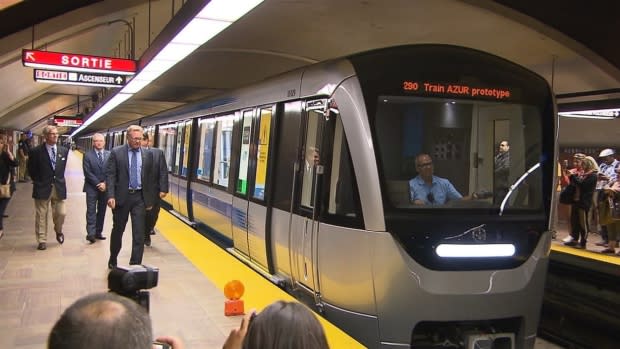Montreal to get 153 new Azur metro cars in deal with Bombardier-Alstom consortium
The Bombardier-Alstom consortium will supply 153 additional Azur cars for Montreal's metro for a total of 17 nine-car trains. This news comes just days after Bombardier announced it would be cutting 5,000 jobs, with half of them being in Quebec.
"With 60 per cent Canadian content, this order will leverage a network of several hundred suppliers across Quebec," it says.
Nearly 170 Bombardier employees will be assigned to this new order, which will also involve 70 employees at the Alstom plant in Sorel-Tracy.
Most of the manufacturing and the total of the final assembly of these additional vehicles will be undertaken at Bombardier's facility in La Pocatière, in the Lower St. Lawrence.
On Monday, François-Philippe Champagne, Minister of Infrastructure and Communities, announced an investment of over $215 million to support the purchase by Montreal's transit agency, the Société de transport de Montréal (STM).
The government of Quebec and the STM are also contributing to the project, bringing the total investment to over $580 million, according to a press release.
Besides ensuring Bombardier's factory in La Pocatière and the Alstom plant in Sorel-Tracy can retain numerous jobs, these new cars will replace part of the fleet of MR‑73 cars to improve the quality and capacity of Montreal's public transit network, the statement says.
New cars can carry more passengers
Designed specifically for Montreal's metro system, Azur trains entered service in Montreal in February 2016.
Larger and connected by bridges that people can walk through, the Azur metro cars can carry eight per cent more passengers than the old cars, which represents a capacity of several million more passengers each year for the Montreal metro.

The project also includes the purchase of additional communications equipment for the new trains, as well as the disposal and recycling of the old cars.
The aim is to improve the performance, efficiency and reliability of Montreal's transit system while making it more accessible and preparing for anticipated future increases in ridership.
"Modern efficient public transit infrastructure plays an important role in developing sustainable communities and supporting good, middle-class jobs," says Champagne in the statement.
"Our government's historic investment in subway cars for the STM will improve the reliability and comfort of services for the people of Montreal."

